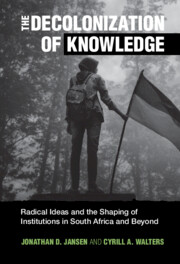 The Decolonization of Knowledge
The Decolonization of Knowledge Book contents
- The Decolonization of Knowledge
- The Decolonization of Knowledge
- Copyright page
- Contents
- Figures
- Acknowledgements
- 1 Introduction
- 2 Institutional Posturing
- 3 On the Institutionalization of Knowledge
- 4 The Contending Meanings of Decolonization and the Implications for Radical Curriculum Change
- 5 Regulating Radical Ideas
- 6 The Uptake of Decolonization
- 7 The Uptake of Decolonization
- 8 How Does a Radical Curriculum Idea Travel through Institutional Life?
- References
- Index
6 - The Uptake of Decolonization
The Case of the Humanities and Social Sciences
Published online by Cambridge University Press: 22 June 2022
- The Decolonization of Knowledge
- The Decolonization of Knowledge
- Copyright page
- Contents
- Figures
- Acknowledgements
- 1 Introduction
- 2 Institutional Posturing
- 3 On the Institutionalization of Knowledge
- 4 The Contending Meanings of Decolonization and the Implications for Radical Curriculum Change
- 5 Regulating Radical Ideas
- 6 The Uptake of Decolonization
- 7 The Uptake of Decolonization
- 8 How Does a Radical Curriculum Idea Travel through Institutional Life?
- References
- Index
Summary
This chapter presents the exemplary curricula of five academics whose work reflects some of the key ideas in decolonization: Even if some of them are reluctant to use the term itself as an adequate descriptor for their efforts at transforming knowledge at their universities. The disciplines in focus are political science (politics), philosophy, psychology, media studies, and the visual arts. A key finding is that these innovations existed in institutional enclaves before the decolonization moment and that they remain exceptional rather than commonplace in the university curriculum.
- Type
- Chapter
- Information
- The Decolonization of KnowledgeRadical Ideas and the Shaping of Institutions in South Africa and Beyond, pp. 147 - 171Publisher: Cambridge University PressPrint publication year: 2022
- 1
- Cited by
